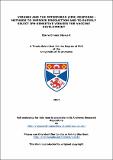Files in this item
Viruses and the interferon (IFN) response : methods to improve production and to rapidly select IFN-sensitive viruses for vaccine development
Item metadata
| dc.contributor.advisor | Adamson, Catherine S. | |
| dc.contributor.advisor | Randall, Richard Edward | |
| dc.contributor.author | Stewart, Claire Emma | |
| dc.coverage.spatial | xv, 212 leaves | en_US |
| dc.date.accessioned | 2017-08-01T15:46:45Z | |
| dc.date.available | 2017-08-01T15:46:45Z | |
| dc.date.issued | 2017 | |
| dc.identifier.uri | https://hdl.handle.net/10023/11346 | |
| dc.description.abstract | Manipulation of a virus’s capacity to circumvent the interferon (IFN) response aids both fundamental studies as well as many practical applications including the design of live-attenuated vaccines. However, these IFN-sensitive viruses are often difficult to grow to high titer in cells that produce and respond to IFN. In the first part of this study we further characterised the use of the IFN inhibitor, Ruxolitinib (Rux) for its ability to block the IFN response and subsequently enhance replication of IFN-sensitive viruses. This study has shown that i) Rux could provide a more rapid and therefore more efficient alternative for the growth of IFN-sensitive viruses than the current default option, growth in Vero cells and ii) addition of Rux can increase growth of multiple viruses in numerous cell-lines. These results indicate that as well as aiding fundamental studies the addition of Rux could become a valuable technique in a number of virological applications including live attenuated vaccine production and techniques to isolate newly emerging viruses. In the second part of this study we developed a novel method to isolate IFN-sensitive viruses from Paramyxoviruses, using PIV5 (Parainfluenza virus 5) as an experimental model system to obtain selection parameters. We successfully isolated three mutant viruses (rPIV5mCh-α, rPIV5mCh-β and PIV5 W3-γ) that each contain mutations within the IFN antagonist V protein and the P protein which is essential for RNA replication. Subsequently, both rPIV5mCh-α and PIV5 W3-γ were shown to contain non- functional V proteins and exhibit IFN-sensitivity. Ultimately, this study is the first step towards creating a general method to isolate various types of IFN-sensitive viruses that as well as aiding fundamental studies, may be further developed as attenuated vaccines for clinically important viruses lacking vaccines. | en_US |
| dc.language.iso | en | en_US |
| dc.publisher | University of St Andrews | |
| dc.subject.lcc | QR187.5S8 | |
| dc.subject.lcsh | Vaccines--Development. | en |
| dc.subject.lcsh | Interferon. | en |
| dc.title | Viruses and the interferon (IFN) response : methods to improve production and to rapidly select IFN-sensitive viruses for vaccine development | en_US |
| dc.type | Thesis | en_US |
| dc.type.qualificationlevel | Doctoral | en_US |
| dc.type.qualificationname | PhD Doctor of Philosophy | en_US |
| dc.publisher.institution | The University of St Andrews | en_US |
This item appears in the following Collection(s)
Items in the St Andrews Research Repository are protected by copyright, with all rights reserved, unless otherwise indicated.

